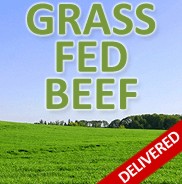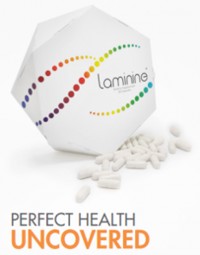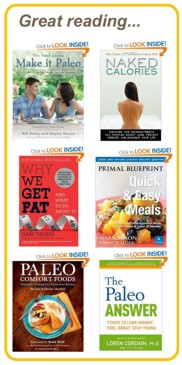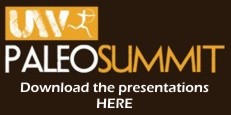Paleo Diet News Review: Healthy Sexy Happy
Nancy Deville is clearly doing something right. At sixty years old, she looks considerably younger. But it’s not just her looks that pay testament to her lifestyle choices.
In addition to being a health researcher and real foods advocate, she’s also a novelist (her book Karma, a psychological thriller set in the disturbing world of sex trafficking, was an award-winning finalist in the “Best New Fiction” category of the National Best Book Awards 2009) and a documentary maker (she’s currently planning a trip to India which will be documented in the travelogue Searching For The Buddha).
She makes no secret of where she gets her energy: it’s by following her self-devised Healthy Sexy Happy programme which combines a diet of real, whole, living food, an elimination of avoidable toxins, sensible exercise, hormone replacement where necessary, and a practice of self-compassion meditation.
Here’s what she has to say about the programme, and the problems it aims to solve:
The point of her approach is simple, and is based on the notion of halting and repairing the unnecessary damage we do to our bodies through poor lifestyle habits and a diet high in factory-produced foods. She notes that one result of the Standard American Diet is “accelerated aging”, and the book outlines twelve steps (she calls them “Ultimate You Skills”) which, combined, can halt this destructive and debilitating process. In short, the programme is about:
Building up more than you break down.
This indicates that Deville’s understanding of metabolism goes far beyond that which is commonly described in the media - and even by much of the medical profession. Thankfully, you’ll find no “speed up your metabolism to lose weight” cod-science here. Rather, the programme encourages us to see metabolism as something that continually strives for (and can be assisted towards) balance, so that we can heal, repair and grow.
Although much of what she suggests in her latest book Healthy Sexy Happy: A Thrilling Journey To The Ultimate You is definitely compatible with the paleo diet, her nutritional influences come from three main sources: Weston A. Price; an extended period of time spent travelling in Europe, Japan and India; and her grandmother. Of the latter, she says:
My grandmother, who had stumbled into a health food lecture when she was in her late thirties (during WWII), was the “kook” of the family. I learned a lot about physiology from this woman with a third grade education.
Those influences have resulted in an approach to nutrition that sees food as the complex, multi-faceted entity it is. As fuel, pleasure, and health-promoter:
The human body is dynamic, which means it’s breaking down and sloughing off cellular waste, bringing in new building materials and then remodeling, repairing, and rebuilding. The building supplies are the biochemicals in a balanced diet of real, whole, living food. Animal foods, including cholesterol, make cells, tissues, bones and other lean body mass. Fats are used as clean burning energy, to build cells including brain cells, and to make hormones, which are the chemical communication system of your body. Cholesterol is the precursor to sex hormones. Plants provide antioxidants to neutralize free radicals, as well as vitamins, minerals, trace minerals, and enzymes that are biocatalysts for rebuilding. Your body is the house your mind and spirit live in. Happiness begins with taking care of your house and giving it what it needs to thrive. The rest falls into place when your house is in order.
This last quote touches on one of the most interesting aspects of Healthy Sexy Happy. It’s clear that the author isn’t encouraging us to get healthy, sexy and happy just for the sake of it, but rather because this is the state in which we are best able to achieve lasting peace and fulfillment of our unique potential. Consequently, the book includes a fascinating discussion - backed up with anecdotal and scientific evidence - of the benefits of mettā meditation, a practice which focuses on cultivating “loving-kindness” to oneself and to other living things.

Photo courtesy of www.nancydeville.com
Deville’s own approach to other living things bears comment. She takes a clear stand against the purported health-benefits of veganism, and yet is a passionate advocate against animal cruelty. She points out that one of the best ways to encourage humane treatment of animals is to stop buying and eating factory foods:
I discourage eating factory produced animal products. Factory animals are tortured in concentration camps called concentrated animal feeding operations (CAFOs) from birth until gruesome slaughter. Whether you eat a fast-food burger or a steak from a five-star restaurant, you are likely eating a tortured animal.
This doesn’t mean avoiding all animal products, however. In fact, quite the opposite:
Loving animals doesn’t change human physiology. I don’t support the vegan diet because the vegan diet doesn’t support the human body. It took me a while to get up the nerve. Now I want to help slay that dragon before more people get hurt. My program is all about building up more than you break down. If you’re not consuming complete proteins every day with every meal, you’re going to break down more than you build back up again.
Don’t be fooled into thinking that this means she has little interest in vegetables. A large portion of the book is given over to discussing the health benefits of what Deville calls “green veggie juice” (akin to a blended salad or green smoothie). She sees this as a key pillar of her programme, noting that it provides a range of detoxifying factors which act synergistically with the powerful macronutrients provided by animal foods, thus helping us to counteract the effects of our increasingly toxic environment.
Pleasingly, she steers clear of the notion that juicing per se is a healthy practice, making it clear that any juicer which spits out the pulp of the vegetables is also spitting out a good deal of the nutritional value.
Here’s her favourite recipe:
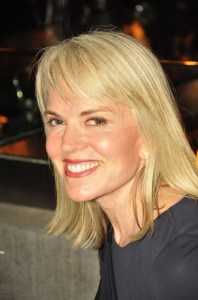
Nancy Deville
In this interview on her website, she is characterised as a “meat-eating, pot-smoking, sex-having Buddhist. With a mission.”
There’s no doubt that this stimulating combination of qualities shines through in the book, which is a lively mix of personal anecdote (such as her journey to recover her thyroid health after being burned out by a high-powered Hollywood career) and solid scientific research (her previous book, Death By Supermarket: The Fattening, Dumbing Down, and Poisoning of America, has received plaudits for its thorough summation of the evidence against factory food practices).
If you’re already well-versed in the paleo diet, this book is likely to expand your horizons considerably, not least because of its scope, which ranges from the right way to nourish the brain, through to the benefits of using bioidentical hormone replacement therapies.
If you’re just developing an interest in the paleo lifestyle, Healthy Sexy Happy serves as a powerful introduction to a paleo-style way of eating and living. Deville herself exhorts us all to “be modern hunter-gatherers”.
Most importantly, if you want to develop a more detailed understanding of exactly why eating and living this way can have a positive effect on your body, mind and spirit, this book will teach you a great deal in an informative, illuminating and inspiring way.
After all - who doesn’t want to be healthy, sexy and happy?
Brian Cormack Carr is a professional life and career coach, writer, and advocate of a real foods diet.
His home on the web is www.cormackcarr.com where you will find more articles, a free newsletter, and information about his online career-creation programme www.vitalvocation.com. You can follow Brian on Twitter: @cormackcarr









